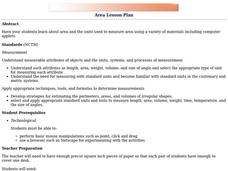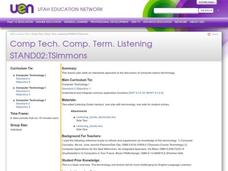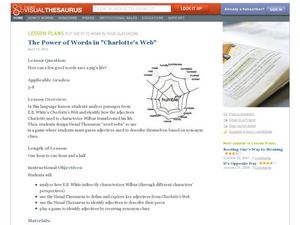EngageNY
First-Person Computer Games
How do graphic designers project three-dimensional images onto two-dimensional spaces? Scholars connect their learning of matrix transformations to graphic design. They understand how to apply matrix transformations to make...
TryEngineering
Solving Problems with Decision Trees
Combat crime with computers. The instructional activity teaches young computer scientists about decision trees and how to use them. They consider telecommunications subscriptions and how decision trees can help detect fraud.
Radford University
Developing a Trigonometry Phone App
What's one more app? After reviewing how to calculate missing side lengths or angle measures in a right triangle, pupils create instructions for a phone app to do all of the tedious work. They must consider all nine cases of known...
Mathalicious
XBOX Xpotential
Touchdown! This is an exponentially insightful lesson that explores the growth of football games with different video game consoles. Class members discuss whether the increase of mergahertz can be described as linear or exponential....
Curated OER
temperature and the Scientific Method Lesson Plan
Sixth graders study heat, temperature, and heat transfer. Using probeware, the teacher demonstrates boiling points. Students participate in experiments and record the beginning and ending temperatures and mass of objects. After...
EngageNY
Complex Numbers and Transformations
Your learners combine their knowledge of real and imaginary numbers and matrices in an activity containing thirty lessons, two assessments (mid-module and end module), and their corresponding rubrics. Centered on complex numbers and...
Curated OER
Area Lesson Plan
Learners explore geometry by using computer applications. For this spatial measurement lesson, students discuss the difference between area, weight, volume and other forms of measurement. Learners utilize computer applications to find...
Curated OER
Using Computer for Statistical Analysis
Students use the computer and S'COOL data for statistical analysis.
TryEngineering
Give Binary a Try!
Digital, analog, and now binary clocks? The lesson teaches individuals how to interpret binary code. They use an online software program to read binary clocks.
EngageNY
Using Matrix Operations for Encryption
Data encryption is an important security measure for sensitive data stored on computers. Pupils learn how to utilize matrices for creating code. They also get a great review of matrix multiplication, inverse matrices, and the identity...
Kenan Fellows
Reading Airline Maintenance Graphs
Airline mechanics must be precise, or the consequences could be deadly. Their target ranges alter with changes in temperature and pressure. When preparing an airplane for flight, you must read a maintenance graph. The second lesson of...
Curated OER
Computer Terminology
Students review the history of computer technology and how much it has changed over time. In groups, they examine the different looks of technology from the past to today and are introduced to computer terminology. Individually, they...
Shodor Education Foundation
Multiple Linear Regression
You'll have no regrets when you use the perfect lesson to teach regression! An interactive resource has individuals manipulate the slope and y-intercept of a line to match a set of data. Learners practice data sets with both positive and...
Curated OER
Discovery Research of Quadratics
Students investigate the properties behind the quadratic equation. In this algebra lesson, students identify quadratic equation in the real world. They graph the parabola and identify the vertex and intercepts.
Curated OER
Building Understanding of Rate of Change/Slopes Using Alice
Students explore slope as a rate of change. In this eighth grade mathematics activity, students investigate real-world problems to determine rate of change and transform it into a linear representation, thus determining slope. Students...
Curated OER
The Power of Words in Charlotte's Web
"How can a few good words save a pig's life?" Posed with this question, your ELD students explore E.B. White's Charlotte's Web in a meaningful, valuable way. By analyzing specific word choice from the book, especially the excerpts...
Discovery Education
Architects in Action
Hands-on and real-world applications are great ways to teach mathematical concepts. Creative thinkers examine how ratios are used to create scale models of buildings and structures. They practice working with ratios by looking at a map...
TryEngineering
Give Binary a Try!
Students apply binary code in software applications for computer engineers. For this binary code lesson, students read about binary code and its applications to computer engineers. They download software and read an online binary clock....
Curated OER
E3 Ret Lesson Plan
Students explore friction. In this physics lesson plan, students will cover metal blocks with film to determine the changes caused by static and kinetic friction.
Curated OER
Water Lesson Plan
Students discuss the importance of water in our daily lives. In this physics instructional activity, students calculate the pressure of water tower systems. They investigate the effect of certain variables using a computer simulation.
EngageNY
Logarithms—How Many Digits Do You Need?
Forget your ID number? Your pupils learn to use logarithms to determine the number of digits or characters necessary to create individual ID numbers for all members of a group.
EngageNY
Modeling Riverbeds with Polynomials (part 2)
Examine the power of technology while modeling with polynomial functions. Using the website wolfram alpha, learners develop a polynomial function to model the shape of a riverbed. Ultimately, they determine the flow rate through the river.
Curated OER
Algebra I Lesson
Ninth graders explore applications of Algebra. In this Algebra I lesson, studetns investigate eight applications of algebra ranging form the mathematics of roller coasters to tracking the popularity of a web site.
Curated OER
The Games Robots Play
Students learn about how robots are programmed to play games. They then construct robot applications (basic computer codes) for playing tic-tac-toe comprised of if-then logic sequences. Students then compete in teams using their...























